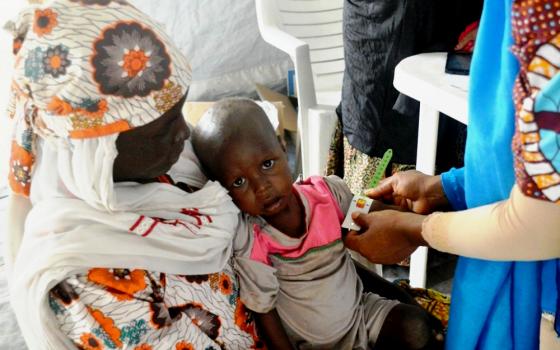Because of war and drought, four nations are on the verge of the greatest humanitarian crisis since World War II, The New York Times warned in a March 27 report from Somalia.
"For the first time since anyone can remember, there is a very real possibility of four famines — in Somalia, South Sudan, Nigeria and Yemen — breaking out at once, endangering more than 20 million lives," the newspaper reported. "The famines are coming as a drought sweeps across Africa and several different wars seal off extremely needy areas. United Nations officials say they need a huge infusion of cash to respond. So far, they are not just millions of dollars short, but billions."
Drought is key in this situation: Aid officials underestimated the importance of and need for water in the last famine and are determined not to this time. But already, deadly diseases are spreading in relief camps because of a lack of water and the resulting lack of hygiene.
Even in a normal year, getting the money needed to alleviate this crisis would be difficult. But if President Donald Trump has his way, it may become impossible.
The Independent reports that the United States was the biggest single donor to the United Nations and provided more than $2 billion to the World Food Program — a quarter of the program's total budget.
But Trump wants to slash foreign aid and the amount the United States contributes to the United Nations, moves that would decimate relief efforts.
As I reported last week, the current budget, which runs through Sept. 30, calls for the United States to spend $2.7 billion on foreign aid, which sounds like a lot but is actually one-tenth of 1 percent of the federal budget.
In other words, if Trump succeeds in removing foreign aid from the budget that begins Oct. 1, it would devastate relief efforts in areas already breeding hatred and distrust — not to mention the human suffering, death and disease ravaging the people there — to save one-tenth of 1 percent of the federal budget.
"The international humanitarian system is at its breaking point," Dominic MacSorley, chief executive of Concern Worldwide, a large private aid group, said in the Times story.
In these four countries, the prices for food and water — when they're even available — have put them beyond the reach of most. Famine has already been declared in some areas, and officials say millions are on the brink of starvation.
If these cuts go through, we will risk our very souls to save one-tenth of 1 percent of the budget. I, for one, am not willing to take that gamble.
Rolling the dice on climate change
On March 28, Trump signed an executive order to gut the Clean Power Plan, President Barack Obama's signature law to reduce climate change. The law would have required power plants that burn fossil fuels to reduce their carbon dioxide emissions by 2030 to 32 percent below 2005 levels, according to the U.S. Environmental Protection Agency.
That's important because 82 percent of the greenhouse gases produced in the United States is carbon dioxide. Reducing those emissions from power plants is also the easiest way to make a dramatic cut, as they produce 31 percent of the carbon dioxide released in the United States.
The plan also cut emissions of sulfur dioxide and nitrogen oxide — which cause soot and smog — by 90 percent and 72 percent, respectively.
According to the EPA, those cuts would have annually prevented:
- 3,600 premature deaths;
- 1,700 heart attacks;
- 90,000 asthma attacks;
- 300,000 missed workdays and school days.
While critics said the law would cost jobs, raise electricity prices and hurt the economy, the EPA and others said that wasn't true. The EPA estimates the law would have produced:
- Climate benefits of $20 billion;
- Health benefits of up to $34 billion;
- Net benefits of up to $45 billion.
Also on March 28, the Adrian Dominicans issued a statement saying the gutting of the Clean Power Plan "sends a dangerous signal to the rest of the world that the United States is reneging on its pledge to cut carbon emissions." That, the congregation said, puts the historic Paris Agreement on climate change and the well-being of people and the planet in jeopardy.
"It will give a green light to planet-warming carbon pollution, threatening to relegate our children to an irreversible future of extreme weather events, droughts, floods, and untold billions in costs to adapt to these harmful impacts. And it will increase threats to endangered species and vulnerable ecosystems," the statement said.
The statement noted that Pope Francis wrote in his encyclical "Laudato Si', on Care for Our Common Home" that these kind of moves hurt future generations, as "intergenerational solidarity is not optional, but rather a basic question of justice, since the world we have received also belongs to those who will follow us."
Remember, links, tips and accounts of the response to any crisis anywhere in the world are always welcome at [email protected].
[Dan Stockman is national correspondent for Global Sisters Report. Follow him on Twitter or on Facebook.]


